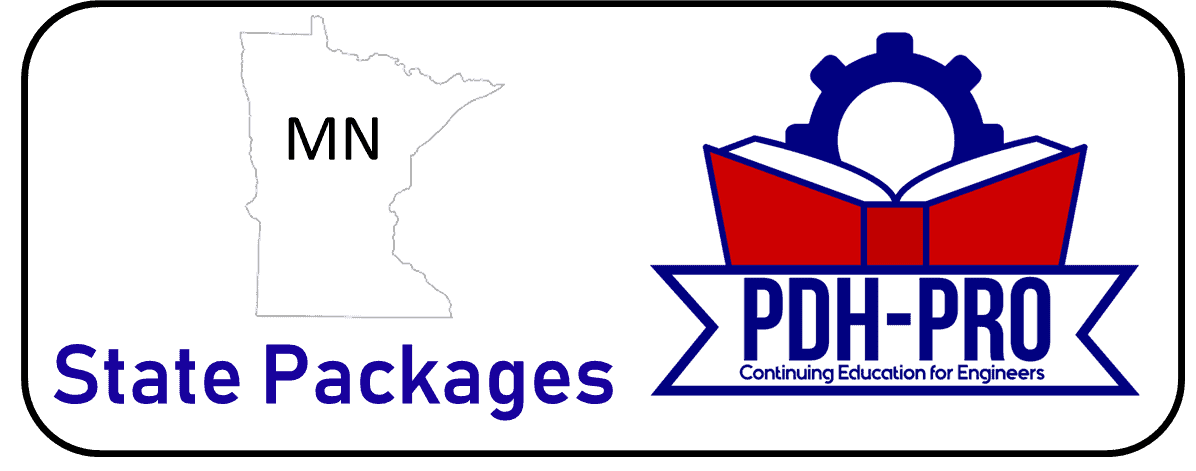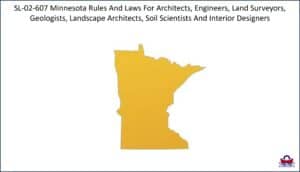MN PE Education Requirements
Table of Contents
Minnesota Statute 326.107 outlines the continuing education requirements for Professional Engineer license renewal in the State of Minnesota. Minnesota PEs are required to obtain 24 professional development hours every two years. Beginning with the June 30, 2016 renewal, two of those 24 hours must be dedicated to ethics.
The Minnesota Board of Architecture, Engineering, Land Surveying, Landscape Architecture, Geoscience and Interior Design (AELSLAGID) is the entity that oversees PE licenses and EIT certifications in Minnesota. Visit the Board of AELSLAGID’s continuing education page for information on Minnesota’s continuing education requirements for Professional Engineers.
| No of PDH hours required | 24 PDH | |
| Renewal period | June 30th of even numbered years | |
| Provider approval | The Board does not pre-approve course providers | |
| Course content approval | Technical, non-technical, regulatory, ethical, and business practice activities for a well-rounded education provided the education directly benefits the health, safety, or welfare of the public. There must be a clear purpose and objective for each activity which will maintain, improve, or expand skills and knowledge obtained prior to initial licensure or certification or develop new and relevant skills and knowledge. 2 PDH each renewal cycle must be in the subject of engineering ethics. The ethics PDH must be earned within the renewal biennium and cannot be carried forward. | |
| Maximum PDH hours to carry over | 12 PDH | |
| Online courses | No limit on online courses. | |
| State Board Website | https://mn.gov/aelslagid/continuinged.html |
We prepared a detailed summary and review of the Minnesota continuing education requirements (read the article).
Engineering Continuing Education Requirements for Minnesota
As a professional engineer in Minnesota, there will come a time when you have to renew your license. When that occurs, you may be asking what the continuing education requirements for Minnesota engineers are.
The answer to that question is that you must complete 24 professional development hours (PDH) every 2 years. You can take courses online, and at least 2 hours must be in ethics. The renewal date is June 30 of even-numbered years. You can use up to 12 PDH of the required 24 for the next renewal cycle, but you can’t use any hours from ethics courses that you’ve taken.
PDH Credits
The 24 PDH credits for license renewal are mandated by the Minnesota Board of Architecture, Engineering, Land Surveying, Landscape Architecture, Geoscience, and Interior Design (AELSLAGID). The Board requires that you take courses in ethics, technical, non-technical, regulatory, and business practice activities. They want to ensure that you have a well-rounded education that directly benefits the health, safety, and welfare of the public.
The purpose of the continuing education requirements for Minnesota engineers is to maintain, improve, or expand the knowledge and skills that were obtained prior to getting your license. The Board does not have to pre-approve the providers and courses you take, and online PDH credits are allowed as long as they feature quizzes and exams.
You are expected to maintain your completion records for 2 to 4 years. Renewing your license electronically is available during even-numbered years from April through June.
License Renewal Dates for MN PEs
During even-numbered years, your license is renewed on June 30. You are expected to complete the license renewal form and send it to the Board with proof that you have completed the continuing education requirements for Minnesota engineers, along with any other important documents and a check or money order for $180. In addition, you must also maintain any documentation about completed courses for 2 to 4 years.
Engineering Ethics and Professional Conduct for MN Engineers
As a Minnesota professional engineer, to renew your license, you must complete 2 hours of professional ethics courses every 2 years. These ethics courses don’t need to be specific to engineering.
The other 22 hours of your continuing education courses can be in technical, non-technical, regulatory, and business practice activities that directly improve the welfare, safety, and health of the public.
Record Keeping Requirements
You are required to hold onto any records for the courses and activities you have completed for your continuing education requirements for 2 to 4 years. The record should show when the class or activity took place, the subjects that were covered, how long the activity or program lasted, how many PDH credits you earned, the name of the organization that sponsored the class/activity, and any registration receipts, if applicable.
The Board may ask for this information to verify the renewal application, if there are any address noncompliance complaints against you, or if they conduct a random audit. It is your responsibility to maintain and keep track of your supporting documentation.
Continuing Education Activities Accepted by the Minnesota Board
When it comes to online courses, self-study courses, live webinars, or any other activity accepted by the Board to renew your license, they must show evidence of pre-planning and be properly organized and presented sequentially.
The courses/activities’ purpose and objective should be clear, and they should enhance your professional skills and knowledge. The presenter of the course must possess the education and/or experience that qualifies them to present the course. The course creator must also possess the proper documentation, record keeping, and reporting to prove that you participated in the course/activity.
Acceptable Courses and Activities for MN Egineers
When it comes to continuing education requirements for Minnesota engineers, some of the accepted PDH credits include the following:
- Completing or auditing a college course
- Self-study courses that include an exam
- Short courses, seminars, or tutorials that have been televised or videotaped
- In-house, self-sponsored educational programs
- Study tours, either writing or visual, that are structured and presented by you
- Teaching or presenting a seminar or course that qualifies under the Board’s guidelines
- Preparing for a first-time presentation
- Authoring papers, books, or articles that get published
- Preparation that goes into presenting or writing works
- Writing or grading professional exams, with a maximum of five PDH every 2 years
- Presenting or sharing your professional experience to committees, commissions, and/or public boards
- Being a volunteer for building code advisory boards, urban renewal boards, or planning commissions that aren’t work related, with a maximum of 10 PDH every 2 years
- Earning 10 patents for 10 PDH credits in the 2 years the patent was granted
Unacceptable PDH Courses and Activities
It is your responsibility to ensure that the courses or activities you take for your license renewal meet the continuing education requirements for Minnesota engineers. Some of the courses and activities that aren’t accepted by the Board include the following:
- College courses that aren’t specifically designed for engineers
- Refresher courses, training programs, or orientation offered by your company
- Courses that were taken in the past but have been renamed
- Self-improvement courses on non-technical topics that you take for financial gain
- Courses on general safety or first air
- Attending trade shows or conventions
- Being a member of a club or professional society
Pre-Approval of Continuing Education Activities
The Board does not pre-approve any continuing education courses, but they do provide a Continuing Education Assessment Form to help you decide if the courses/activities meet the continuing education requirements for Minnesota engineers set forth by the Board.
Sources of Free Engineering Continuing Education Courses
There are many organizations that offer free continuing educations courses on their websites, including engineering societies such as the ASCE, NSPE, and ASME, among others.
Minnesota Engineering Licensing Requirements
To become a state-licensed professional engineer in Minnesota, you must complete several steps. These include the following:
Step 1: Complete an engineering program accredited by the Accreditation Board for Engineering and Technology.
Step 2: Pass the Fundamentals of Engineering exam.
Step 3: Spend at least 4 years working in the field and pass the Principles of Practice Engineering exam that is administered by the National Council of Examiners for Engineering and Surveying. Passing this 8-hour exam shows that you have attained a level of competency that makes you a specialist in your field.
Engineering Discipline Restrictions for Continuing Education Courses
There are no restrictions or limits on the continuing educations courses you can take. You have the opportunity to take courses in regulatory, ethical, technical, non-technical, and business practices as long as they make you a more well-rounded professional.
The Value of Continuing Education
When it comes to continuing education requirements for Minnesota engineers, taking continuing education courses is imperative to your professional growth and development. Ethics courses will keep you aware of how to properly conduct yourself as a professional. Taking a variety of courses and activities broadens your knowledge base and makes you a better person and a better engineer.


